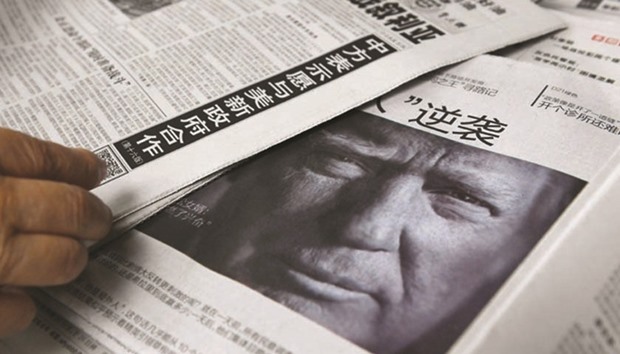China expressed “serious concern” yesterday after US President-elect Donald Trump said the United States did not necessarily have to stick to its long-held stance that Taiwan is part of “one China”, calling it the basis for relations.
Trump’s comments on Fox News Sunday, questioning nearly four decades of US policy, came after he prompted a diplomatic protest from China over his decision to accept a telephone call from Taiwan President Tsai Ing-wen on December 2.
China’s foreign ministry said co-operation was “out of the question” if Washington could not recognise Beijing’s core interest on Taiwan, indicating that it would reject any effort by Trump to use the issue as a bargaining chip in a long list of commercial and security problems facing the two countries.
“China has noted the report and expresses serious concern about it. I want to stress that the Taiwan issue concerns China’s sovereignty and territorial integrity, and involves China’s core interests,” said ministry spokesman Geng Shuang. “Upholding the One China principle is the political basis for developing China-US ties.”
“If this basis is interfered with or damaged then the healthy development of China-US relations and bilateral cooperation in important areas is out of the question,” he told a daily news briefing.
In a separate statement, the ministry cited Foreign Minister Wang Yi as warning during a trip to Switzerland against moves to damage the One China principle.
“China is paying close attention to developments,” Wang said. “I can clearly say that no matter whether the Tsai Ing-wen authority, any other person in the world, or any other force, if they try and damage the One China principle and harm China’s core interests, in the end they are lifting a rock only to drop it on their feet.”
Despite China’s discontent, it has reached out to Trump.
Spokesman Geng said China’s top diplomat Yang Jiechi, who outranks the foreign minister, had met with Trump advisers, including his pick for national security adviser, retired Army Lieutenant General Michael Flynn, during a transit in New York on his way to Latin America in recent days.
“Both sides exchanged views on China-US ties and important issues both are concerned with,” Geng said, without elaborating.
He did not give a precise date for the meeting, and it was unclear if it occurred before or after Trump’s latest remarks on Taiwan, which Beijing considers a renegade province.
Geng urged the incoming Trump administration to fully recognise the sensitivity of the Taiwan issue and uphold a “one China” policy to “avoid the broader picture of China-US ties being seriously interfered with or damaged”.
“The China-US relationship has global and strategic significance. This not only concerns the happiness of both countries and their people, it concerns the peace, stability, development and prosperity of the Asia Pacific (region) and internationally.”
Trump plans to nominate a long-standing friend of Beijing, Iowa Governor Terry Branstad, as the next US ambassador to China.
But he is also considering John Bolton, a former Bush administration official who has urged a tougher line on Beijing, for the No. 2 job at the US State Department, according to a source familiar with the matter.
In a Wall Street Journal article last January, Bolton said the next US president should take bolder steps to halt China’s military aggressiveness in the South and East China seas.
He said Washington should consider using a “diplomatic ladder of escalation” that could start with receiving Taiwanese diplomats officially at the State Department and lead to restoring full diplomatic recognition.

This photo taken on November 10 shows a newspaper featuring a photo of Trump at a newsstand in Beijing. China has warned Trump that the One China policy is ‘non-negotiable’ and dropping it could lead to Beijing supporting US enemies.
